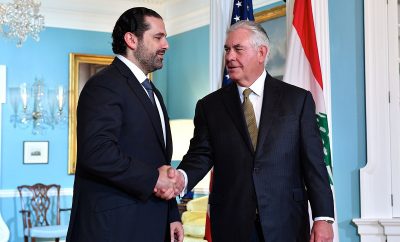 Image courtesy of [thierry ehrmann via Flickr]
Image courtesy of [thierry ehrmann via Flickr]
News
Understanding ISIS’ Radical Apocalyptic Vision
Nearly everyone knows what the Islamic State is doing–treacherous acts and the consolidation of control in territories throughout Iraq and Syria–but few realize exactly what the group’s goals are. ISIS is a unique manifestation of radical Islam that is bent on establishing a religious government that enforces what it believes is to be the purest form of Islam. Supporting that vision is its supporters’ closely held belief that ISIS is bringing about the apocalypse. Yes, deeply rooted in its ideology is the idea that establishing an “Islamic State” will eventually lead to a final battle between good and evil near the small town of Dabiq in northern Syria.
Read More: Is ISIS Actually Islamic?
Graeme Wood, a contributing editor for The Atlantic, recently wrote one of the most comprehensive articles available about ISIS and its ideology. In the article Wood says,
Much of what the group does looks nonsensical except in light of a sincere, carefully considered commitment to returning civilization to a seventh-century legal environment, and ultimately to bringing about the apocalypse.
Much of ISIS’ ideology comes from its interpretation of statements attributed to Muhammad in the Hadith, a foundational text of Islam. The Brookings Institution notes that a prophecy predicts the judgment day will come after a final battle in Dabiq. While interpretations of this prophecy and ISIS’ portrayal of it vary, the group’s general plan is to take over Istanbul (referred to as Constantinople, the former capital of the Roman Empire). After defeating the Romans, they will then defeat the Dajjal (a version of the antichrist) in Dabiq with the help of Jesus who will join Islam.
The first issue of ISIS’ propaganda magazine featured a quote from the group’s founder, Abu Musab al-Zarqawi, who said, “The spark has been lit here in Iraq, and its heat will continue to intensify–by Allah’s permission–until it burns the crusader armies in Dabiq.” It goes on to say that according to the Hadith, a collection of sayings and teachings attributed to the Prophet Muhammad, that town will be important to the group’s “conquests of Constantinople, then Rome.” Musa Cerantonio, one of the Islamic State’s spiritual authorities who was interviewed in Wood’s article, believes that they will expand to Istanbul then face the army of the antichrist–known as the Dajjal in Islamic scripture.
Dabiq, a small rural town in northern Syria, is crucial to the Islamic State’s ideology and recruiting efforts, though militarily it holds very little importance in terms of their expansion in the Middle East. William McCants at the Brookings Institution explained the importance of Dabiq to the Islamic State in a recent article. According to McCants, conquering Dabiq was extremely important to the organization, so much so that they named their English propaganda magazine after it. ISIS explains the name in its first issue saying, “This place was mentioned in a hadith describing some of the events of the Malahim (what is sometimes referred to as Armageddon in English). One of the greatest battles between the Muslims and the crusaders will take place near Dabiq.”
The Islamic State frequently refers to the town in its publications and videos, and after beheading Peter Kassig a spokesperson for the group said, “Here we are, burying the first American Crusader in Dabiq, eagerly waiting for the remainder of your armies to arrive.” Abu Bakr al-Baghdadi, the group’s leader (pictured above), is considered the eighth true caliph–according to the prophecy there will be 12 legitimate caliphs in total.
ISIS’ end-of-days vision is also essential to understanding the group and its desire to form a caliphate. Its belief that its work is bringing the world closer to the judgment day is also very important to recruitment, as its goal may seem much more real and imminent when compared to other radical groups. Since al-Baghdadi declared a caliphate last summer, ISIS has recruited more than 20,000 people from countries all over the world, including over 4,000 from the western world.
While ISIS’ underlying vision is quite chilling, it reveals important details about the group and has important implications for policymakers. One major takeaway is that in many ways ISIS is predictable and its violence is not completely random. The group has clearly stated goals and has set out to pursue them using terror and fear as its methods. ISIS is not random, and to its supporters it is more than just an organization, it is an idea.








Comments